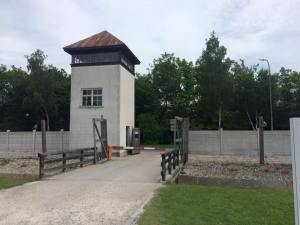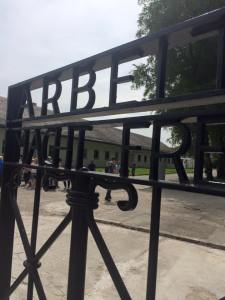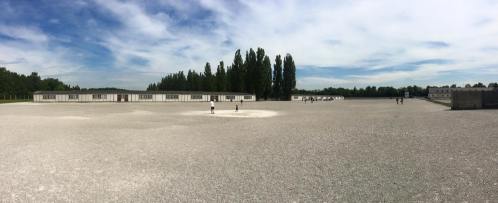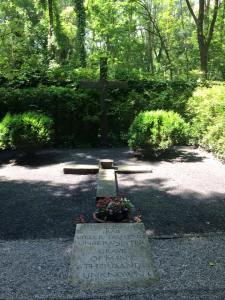The bus pulls up to what appears to be a tourist attraction like any other. Lines can be seen. Children on school trips in brightly colored t-shirts with sticky fingers from ice cream cones that melted in the summer sun. But the moment my feet hit the gravel, I felt different. A coolness enveloped me even in the hot weather. Upon my entrance, a sign indicated that I was walking the  path that thousands of prisoners had been forced to walk just a half a century ago to enter the feared, infamous Dachau Concentration Camp. As I chatted and attempted to carry on small talk with a Chinese student I met on the bus, I was ever aware of the uneasiness that comes with setting foot on grounds where true evil has reigned.
path that thousands of prisoners had been forced to walk just a half a century ago to enter the feared, infamous Dachau Concentration Camp. As I chatted and attempted to carry on small talk with a Chinese student I met on the bus, I was ever aware of the uneasiness that comes with setting foot on grounds where true evil has reigned.
The entrance gate we passed through was the same the prisoners were forced through. The lie “Work will set you free” were words that literally made up the bars of the gate, mocking freedom itself. Open, deserted spaces stretched on and on. The gravel crunching beneath my feet, drudging up dust made me wonder about ashes of the dead that may have comingled with the earth. Who were the nameless, faceless, voiceless that kept me company on my tour through Dachau? I stepped inside the museum. The entrance is where the administrative offices were, and much of the buildings are kept closely to the originals when the camp was in operation. The brutalities, the humiliation suffered, the calm systemization of hatred made my skin crawl. Many times I had the urge to exit the  building and head back to Munich. “I’ve seen enough,” I thought. But I forced myself to continue throughout the entire museum and into the barracks. However, the displays on propaganda gave me pause as I thought about U.S. news, fear-mongering, and the macabre of capitalism.
building and head back to Munich. “I’ve seen enough,” I thought. But I forced myself to continue throughout the entire museum and into the barracks. However, the displays on propaganda gave me pause as I thought about U.S. news, fear-mongering, and the macabre of capitalism.
In the United States, we have adopted the Holocaust as our own memory. I have read and studied in school more about the Holocaust than any other world disaster, war or tragedy. I even had the incredible honor and privilege to study with Professor Elie Wiesel at Boston University. I had always wanted to visit a concentration camp so that I could see it for myself. I am also sensitive to energies and atmospheres of place and people, so I wanted to feel it for myself. Why? Why was this event so different from all the other genocides? As my sorrow and disgust yielded to my questioning, I began to feel anger as well. “Never again” is a frequent Holocaust motto and can be seen throughout the concentration camp at Dachau. Indeed, we have such vivid hindsight now about these horrors. We look into the past at the Civil Rights struggle and the Holocaust and we are removed from them. We can critique something that happened in the past and comfort ourselves with the fact that we aren’t that bad; rather, in fact we are educated about these past tragedies. But does “Never again” mean never discriminate against the Jews? Or does it more broadly speak to never allow hate and ignorance to reign over us, never allow intolerance and elitism so exclude and discriminate against others? Does it mean these things too? And if it does, then how can we affirm “Never again” even as we in the West openly discriminate against Muslim people? Do we apply “never again” to those Others we don’t understand who we may fear are our enemies? Or do we feel justified from our high and mighty position of capitalist power and democratic government to weed out those who thin
But does “Never again” mean never discriminate against the Jews? Or does it more broadly speak to never allow hate and ignorance to reign over us, never allow intolerance and elitism so exclude and discriminate against others? Does it mean these things too? And if it does, then how can we affirm “Never again” even as we in the West openly discriminate against Muslim people? Do we apply “never again” to those Others we don’t understand who we may fear are our enemies? Or do we feel justified from our high and mighty position of capitalist power and democratic government to weed out those who thin k differently? Who are the real terrorists? The United States uses the same propaganda techniques that the Germans used against the Jews and other non-heterosexual non-Aryan people. The United States tortures and prosecutes without due process, breaking its own laws. “Never again”? Who is keeping watch to prevent discriminatory atrocities? I believe we must learn from the tragedies of the past. I am not comparing present-day evils to those of the Holocaust, but I am concerned that in our obsession with memory and American heroism as well as our subjection to propaganda, we blind ourselves to atrocities of the moment happening all around us. Let us honor the lives of those who suffered the worst evils imaginable by courageously looking inside ourselves and our own neighborhoods, cities, states, countries and honestly asking, “is discrimination and intolerance happening again? What am I doing about it?” Then and only then can we affirm “Never again.”
k differently? Who are the real terrorists? The United States uses the same propaganda techniques that the Germans used against the Jews and other non-heterosexual non-Aryan people. The United States tortures and prosecutes without due process, breaking its own laws. “Never again”? Who is keeping watch to prevent discriminatory atrocities? I believe we must learn from the tragedies of the past. I am not comparing present-day evils to those of the Holocaust, but I am concerned that in our obsession with memory and American heroism as well as our subjection to propaganda, we blind ourselves to atrocities of the moment happening all around us. Let us honor the lives of those who suffered the worst evils imaginable by courageously looking inside ourselves and our own neighborhoods, cities, states, countries and honestly asking, “is discrimination and intolerance happening again? What am I doing about it?” Then and only then can we affirm “Never again.”


Brilliantly written. Thank you.
LikeLike